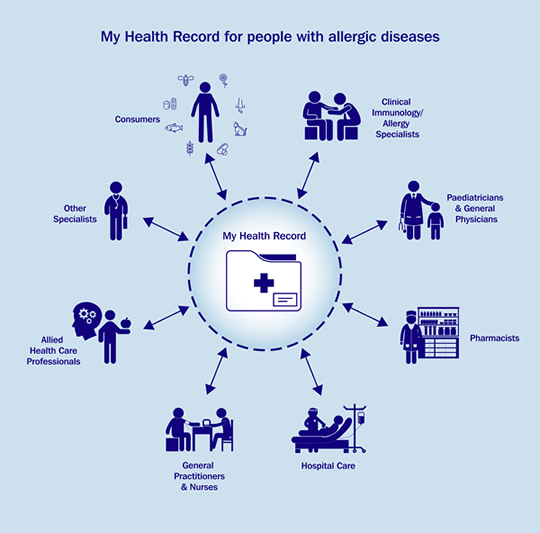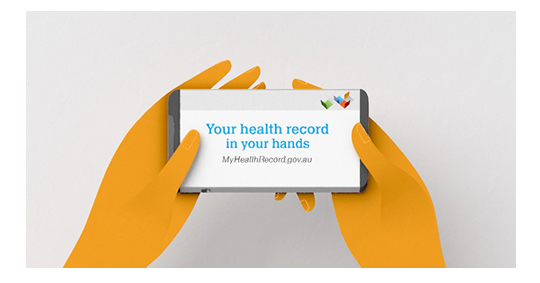My Health Record: A step in the right direction for people with allergic disease
The National Allergy Strategy is working with the Australian Digital Health Agency to improve the quality of allergy information in My Health Record.
Why is My Health Record a good idea for people with allergic disease?
Allergy is a complex disease and often has other related conditions, such as asthma, that need to be considered. You might have lots of different health professionals involved in your or your child’s care, including your GP, pharmacist, specialist(s), dietitian, and hospital staff. People with allergic disease may also experience severe allergic reactions (anaphylaxis) and may not be able to communicate their medical history when it is needed.
My Health Record gives your treating doctor a clearer picture of your health, including information about your recent known allergic conditions, blood test results, medicines you are taking, other illnesses you have, and information about any hospital stays. When health professionals have access to your medical information, they can give you better medical care and treatment.

Although My Health Record is not a complete medical record, some information is better than no information. It could be life saving for doctors to know if you or your child are allergic to some foods and medications.
For more information see:
| As of February 2020, 91% of GPs are now registered with My Health Record and 73% are regularly using My Health Record for their patients. |
Using My Health Record to keep track of your child’s health information online
If you are a parent of a child with allergic disease, you want to make sure they are being managed well. It can be difficult to keep track of everything and this is where My Health Record can be useful as it shows their medical information in one place. It is also good to know that you can access My Health Record from a desktop or mobile device.
As an authorised representative, you can manage your child’s My Health Record until they turn 14 years old. It is important to log into your child’s My Health Record and enter emergency contacts, allergies and current medicines.

From 14 years, a young person can manage their own My Health Record. If they would like a parent or guardian or other trusted person to have access to their record, they can add them as a nominated representative.
For more information see:
Who can access your/your child’s health information
By law, only the healthcare providers giving you or your child medical care can look at your My Health Record. Healthcare providers must be registered to use the My Health Record system and use a secured software program to access. If your treating doctor does not have access to an appropriate software program, they can still view information from your My Health Record through the National Provider Portal.
By default, documents in My Health Record are set to general access for healthcare providers. While you can change your access controls at any time, it is not advisable that people with allergic disease hide or remove allergy information. If you remove a document, it will not be available to healthcare providers in an emergency, such as anaphylaxis.
For more information see:
Should I be concerned about the safety of my information?
The Australian Digital Health Agency uses a range of technologies to protect the sensitive personal and health information held in the My Health Record system. All My Health Record data is stored in Australia.
Your My Health Record is linked to a myGov account, which provides you with secure access to your My Health Record. myGov is a secure Australian Government service that can only be accessed using a password, as well as an answer to a secret question or an access code. You can access your My Health Record from a desktop or mobile device. Any security and privacy settings in your My Health Record also apply to information accessed via a mobile app.
For more information see:
- Control your privacy and security
- Frequently asked questions about privacy, security and access to your record
What can I do if my healthcare provider doesn’t want to use My Health Record or doesn’t know how to use it?
It is not compulsory for healthcare providers to use your My Health Record when providing you with healthcare. For example, your clinical immunology/allergy specialist can use their own digital records.
The National Allergy Strategy is encouraging more clinical immunology/allergy specialists to use My Health Record because other health professionals are not able to see their specialist digital records. The system is quite new and it will take time for all specialists to be able to upload information.
By asking your healthcare providers to actively use your My Health Record, you can encourage them to start using it to better track and manage your health together.
Even when a healthcare provider does not access your My Health Record, it can still be a useful way for you to track your medical information.
You can view and track your Medicare and Pharmaceutical Benefits claims information, see your immunisations from the Australian Immunisation Register and your organ donation decisions. Even if your GP isn’t using My Health Record, a hospital pharmacy or other healthcare provider may be able to add and view your health information. In addition, you can add your own medicines, allergies and contacts, so that in an emergency your doctors have access to this information at a critical time.
Hospital stays with allergy and My Health Record – what can I expect?
| 94% of public hospital beds are now connected to the My Health Record system. Public hospital and health services views have increased by more than 300% since March 2019. |
When you or your child go to hospital it is important to provide an accurate and thorough medical history to the hospital staff. It is important to always disclose food allergies to all staff even if they only ask about medication allergies.
There are two main ways that hospitals that are connected use My Health Record:
- If you or your child arrive at hospital in an emergency and are unable to provide a medical history, the emergency clinicians can check your My Health Record for relevant medical information, including medication allergies.
- After your stay in hospital, the hospital prepares a discharge summary that is uploaded to My Health Record so that it can be viewed by other hospitals, your GP or specialist.
It is important to always have your allergy information up to date in My Health Record in case you or your child unexpectedly end up in hospital. Sometimes our hospital stays are unexpected and it is important that healthcare providers can access your up to date allergy information, particularly if you are too unwell to speak for yourself or your child. Make sure your emergency contacts in your/your child’s Personal Health Summary are up to date also. Finally, it is really important that your allergy information in My Health Record can be accessed by all healthcare providers to allow them to provide the best care possible. Therefore, it is important that you do not hide this information from healthcare providers.
More information about this project
Please visit the National Allergy Strategy website for more information about this project and to read our previous newsletter.
Kind regards,
Dr William Smith and Ms Karen Wong
Project Co-leads, National Allergy Strategy MHR Project

